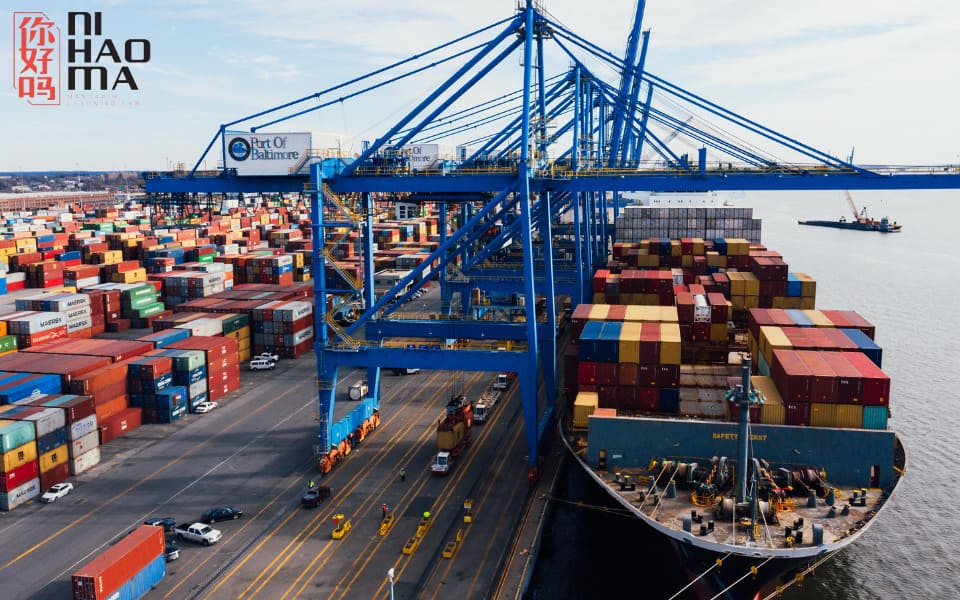Are you working in the import-export industry and frequently dealing with Chinese partners? Beyond professional knowledge, using accurate Chinese vocabulary about import and export will help you build credibility and negotiate more effectively. With Ni Hao Ma, let’s explore a list of essential Chinese trade terms along with sample dialogues to boost your communication skills.
What is import/export in Chinese?
In Chinese, the term “import-export” is written as 进出口 (jìn chūkǒu).
Import-export plays a crucial role in global trade. It is not just about moving goods from one place to another; the process involves complex steps that require solid knowledge of economics, law, and logistics. In fact, the import-export industry serves as a vital bridge, ensuring smooth circulation of goods and driving economic growth across nations.
Chinese vocabulary about import and export
In international business, especially import-export, Chinese is highly valuable since China is one of Vietnam’s largest trading partners. If you aim to work in a Chinese company or collaborate with Chinese partners, mastering Chinese vocabulary about import and export is a must.
Basic Chinese vocabulary about import and export
Here is a set of essential trade terms you should know:
| Chinese | Pinyin | Meaning |
|---|---|---|
| 出口 | chūkǒu | Export |
| 进口 | jìnkǒu | Import |
| 进出口 | jìn chūkǒu | Import-Export |
| 外贸 | wàimào | Foreign Trade |
| 国际贸易 | guójì màoyì | International Trade |
| 货物 | huòwù | Goods |
| 合同 | hétóng | Contract |
| 数量 | shùliàng | Quantity |
| 价格 | jiàgé | Price |
| 订单 | dìngdān | Order |
| 客户 | kèhù | Customer |
| 报价 | bàojià | Quotation |
| 供应商 | gōngyìngshāng | Supplier |
| 采购 | cǎigòu | Purchasing |
| 发货 | fā huò | Ship Goods |
| 收货 | shōu huò | Receive Goods |
| 仓库 | cāng kù | Warehouse |
| 港口 | gǎngkǒu | Seaport |
| 集装箱 | jí zhuāng xiāng | Container |
| 保险 | bǎoxiǎn | Insurance |
| 赔偿 | péicháng | Compensation |
| 贸易协定 | màoyì xiédìng | Trade Agreement |
| 贸易壁垒 | màoyì bìlěi | Trade Barrier |

Chinese vocabulary about customs and taxation
Every import or export shipment must go through strict customs procedures, including declarations and tax payments. Understanding Chinese vocabulary about customs and taxation will help you read and interpret important documents.
| Chinese | Pinyin | Meaning |
|---|---|---|
| 海关 | hǎiguān | Customs |
| 海关总署 | hǎiguān zǒngshǔ | General Administration of Customs |
| 清关 | qīngguān | Customs Clearance |
| 报关 | bào guān | Customs Declaration |
| 缴税 | jiǎoshuì | Pay Tax |
| 税率 | shuìlǜ | Tax Rate |
| 关税 | guānshuì | Tariff |
| 增值税 (VAT) | zēngzhíshuì | Value Added Tax (VAT) |
| 消费税 | xiāofèishuì | Consumption Tax |
| 企业所得税 | qǐyè suǒdéshuì | Corporate Income Tax |
| 个人所得税 | gèrén suǒdéshuì | Personal Income Tax |
| 税则 | shuìzé | Tax Regulations |
| 税号 | shuìhào | Tax Code |
| 税务登记 | shuìwù dēngjì | Tax Registration |
| 纳税人 | nàshuìrén | Taxpayer |
| 征收 | zhēngshōu | Tax Collection |
| 免税 | miǎnshuì | Duty-Free |
| 退税 | tuìshuì | Tax Refund |
| 税收优惠 | shuìshōu yōuhuì | Tax Incentives |
| 海关手续 | hǎiguān shǒuxù | Customs Procedures |
| 报关单 | bào guān dān | Customs Declaration Form |
| 货物申报 | huòwù shēn bào | Goods Declaration |
| 检验 | jiǎnyàn | Inspection |
| 海关编码 (HS编码) | hǎiguān biānmǎ (HS biānmǎ) | HS Code |
| 进口许可证 | jìnkǒu xǔkězhèng | Import License |
| 出口许可证 | chūkǒu xǔkězhèng | Export License |
| 海关通行证 | hǎiguān tōngxíngzhèng | Customs Pass |
| 缴款书 | jiǎokuǎnshū | Tax Payment Receipt |
| 保税区 | bǎoshuìqū | Bonded Area |
| 监管 | jiānguǎn | Customs Supervision |
| 通关手续 | tōngguān shǒuxù | Customs Clearance Procedure |
| 走私 | zǒusī | Smuggling |
| 逃税 | táoshuì | Tax Evasion |
| 违禁品 | wéi jìn pǐn | Prohibited Goods |
Chinese Vocabulary about Contracts and Documentation
Contracts are the backbone of international trade. They record all agreements between buyers and sellers, ensuring that both parties follow clear and legally binding terms. Documentation, on the other hand, refers to the set of papers accompanying a shipment, proving the origin, ownership, and transportation of goods.
If you want to negotiate or draft contracts with Chinese partners, understanding these words will help you secure accurate, clear, and favorable terms for your company.
| Chinese | Pinyin | Meaning |
|---|---|---|
| 协议 | xiéyì | Agreement |
| 合同 | hétong | Contract |
| 订单 | dìngdān | Order |
| 销售合同 | xiāoshòu hétong | Sales Contract |
| 贸易合同 | màoyì hétóng | Trade Contract |
| 补充协议 | bǔchōng xiéyì | Contract Addendum |
| 单据 | dānjù | Document |
| 条款 | tiáokuǎn | Clause / Provision |
| 付款条件 | fùkuǎn tiáojiàn | Payment Terms |
| 付款方式 | fùkuǎn fāngshì | Payment Method |
| 交货条件 | jiāohuò tiáojiàn | Delivery Terms |
| 违反合同 | wéifǎn hétong | Breach of Contract |
| 保密协议 | bǎomì xiéyì | Non-Disclosure Agreement (NDA) |
| 装箱单 | zhuāngxiāngdān | Packing List |
| 出口许可证 | chūkǒu xǔkězhèng | Export License |
| 进口许可证 | jìnkǒu xǔkězhèng | Import License |
| 检验证书 | jiǎnyàn zhèngshū | Inspection Certificate |
| 保险单 | bǎoxiǎndān | Insurance Policy |
| 原产地证书 | yuánchǎndì zhèngshū | Certificate of Origin |
| 提货单 | tíhuòdān | Delivery Order |
| 收货单 | shōuhuòdān | Goods Receipt |
| 授权书 | shòuquánshū | Power of Attorney |
| 运输单据 | yùnshū dānjù | Shipping Documents |

Chinese Vocabulary about Import and Export: Payments and Shipping
In import-export, mastering specialized vocabulary is key to effective communication with international partners. Payment and shipping terms frequently appear in contracts, invoices, and business correspondence. By learning these terms, you’ll avoid costly misunderstandings and handle tasks with greater accuracy and efficiency.
| Chinese | Pinyin | Meaning |
|---|---|---|
| 银行转账 | yínháng zhuǎnzhàng | Bank Transfer |
| 现金支付 | xiànjīn zhīfù | Cash Payment |
| 信用证 | xìn yòng zhèng | Letter of Credit (L/C) |
| 预付款 | yùfùkuǎn | Advance Payment / Deposit |
| 发票 | fāpiào | Invoice |
| 货款 | huòkuǎn | Payment for Goods |
| 支付期 | zhīfùqī | Payment Period |
| 汇票 | huìpiào | Bill of Exchange |
| 分期付款 | fēnqī fùkuǎn | Installment Payment |
| 收款 | shōukuǎn | Collection of Payment |
| 应收账款 | yīng shōu zhàngkuǎn | Accounts Receivable |
| 应付账款 | yīng fù zhàngkuǎn | Accounts Payable |
| 外汇 | wàihuì | Foreign Currency |
| 汇率 | huìlǜ | Exchange Rate |
| 成本 | chéngběn | Cost |
| 赔偿 | péicháng | Compensation |
| 索赔 | suǒpéi | Claim |
| 物流 | wùliú | Logistics |
| 运输 | yùnshū | Transportation |
| 海运 | hǎiyùn | Ocean Shipping |
| 陆运 | lùyùn | Road Transport |
| 空运 | kōngyùn | Air Transport |
| 集装箱 | jízhuāngxiāng | Container |
| 集装箱运输 | jízhuāngxiāng yùnshū | Container Shipping |
| 运输费用 | yùnshū fèiyòng | Transport Charges |
| 运费 | yùnfèi | Freight Charges |
| 提单 | tí dān | Bill of Lading (B/L) |
| 装货 | zhuāng huò | Loading |
| 卸货 | xiè huò | Unloading |
| 入库 | rù kù | Warehousing (Inbound) |
| 出库 | chū kù | Warehousing (Outbound) |
| 货运代理 | huòyùn dàilǐ | Freight Forwarder |
| 仓储费 | cāngchǔfèi | Storage Fee |
| 滞纳金 | zhìnàjīn | Late Payment Penalty |
| 货物保管费 | huòwù bǎoguǎn fèi | Goods Storage Fee |
Sample Dialogues with Chinese Vocabulary about Import and Export
In the import-export industry, companies frequently negotiate with partners about pricing, payment, shipping, and customs clearance. Mastering basic dialogues with Chinese vocabulary about import and export can make your communication smoother and more professional. Below are some sample conversations you can practice at home.
Dialogue 1: Placing and Confirming an Order
A: 我们想订购1000件产品。
(Wǒmen xiǎng dìnggòu yīqiān jiàn chǎnpǐn.)
We would like to order 1,000 units of the product.
B: 好的,请确认产品规格和交货期。
(Hǎo de, qǐng quèrèn chǎnpǐn guīgé hé jiāohuòqī.)
Alright, please confirm the product specifications and delivery time.
A: 规格按上次样品,交货期两个月。
(Guīgé àn shàngcì yàngpǐn, jiāohuòqī liǎng gè yuè.)
The specifications will follow the previous sample, with a delivery time of two months.
B: 没问题,我们会尽快安排生产。
(Méi wèntí, wǒmen huì jǐnkuài ānpái shēngchǎn.)
No problem, we’ll arrange production as soon as possible.

Dialogue 2: Shipping Arrangements
A: 你们打算怎么装运货物?
(Nǐmen dǎsuàn zěnme zhuāngyùn huòwù?)
How do you plan to ship the goods?
B: 我们考虑走海运,运费比较低。
(Wǒmen kǎolǜ zǒu hǎiyùn, yùnfèi bǐjiào dī.)
We are considering ocean shipping since the freight cost is lower.
A: 如果是急单,可以改为空运吗?
(Rúguǒ shì jídān, kěyǐ gǎi wéi kōngyùn ma?)
If it’s an urgent order, can we switch to air transport?
B: 可以,但运费会高很多。
(Kěyǐ, dàn yùnfèi huì gāo hěn duō.)
Yes, but the shipping cost will be much higher.

Dialogue 3: Contract Dispute
A: 根据合同,货物应在上周交付。
(Gēnjù hétóng, huòwù yīng zài shàng zhōu jiāofù.)
According to the contract, the goods should have been delivered last week.
B: 很抱歉,因为清关问题导致延误。
(Hěn bàoqiàn, yīnwèi qīngguān wèntí dǎozhì yánwù.)
I’m very sorry, the delay was caused by customs clearance issues.
A: 我们希望你们能赔偿由此产生的损失。
(Wǒmen xīwàng nǐmen néng péicháng yóucǐ chǎnshēng de sǔnshī.)
We expect compensation for the losses caused by this delay.
B: 我们愿意根据合同条款解决。
(Wǒmen yuànyì gēnjù hétóng tiáokuǎn jiějué.)
We are willing to resolve this issue according to the contract terms.
Final Thoughts
Learning Chinese vocabulary about import and export through themed word lists and real-world dialogues helps you get familiar with industry language faster. With the vocabulary and practical dialogues shared above, you now have a solid foundation to apply directly in daily business communication. At Ni Hao Ma, we hope these examples give you useful insights into import-export Chinese and encourage you to keep practicing. Stay tuned for more practical language guides and industry-focused lessons!



